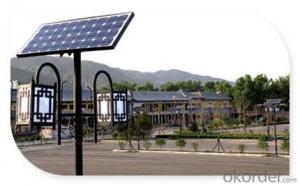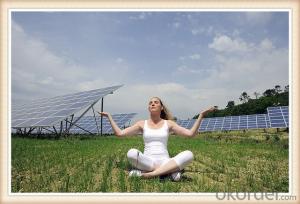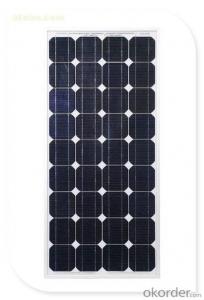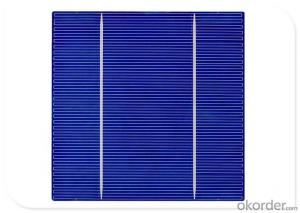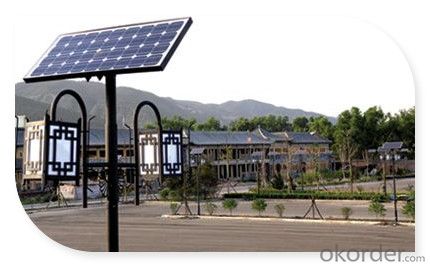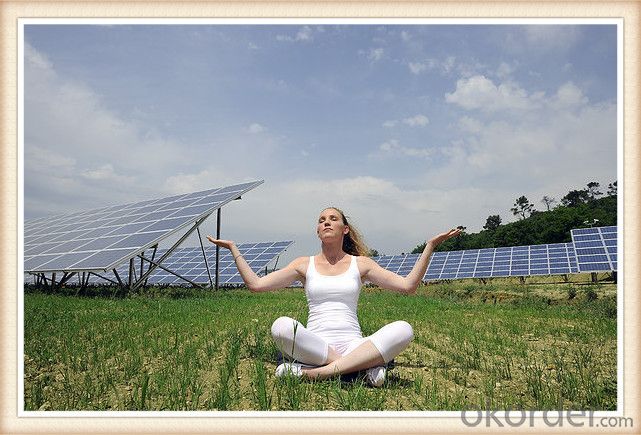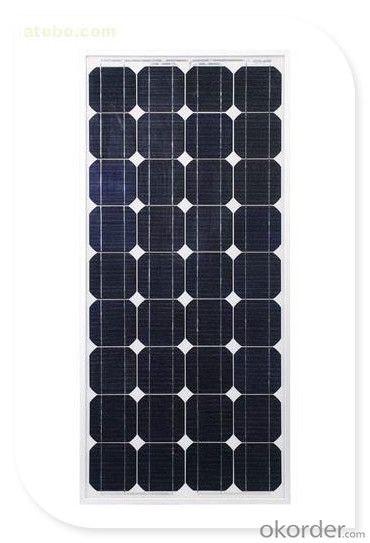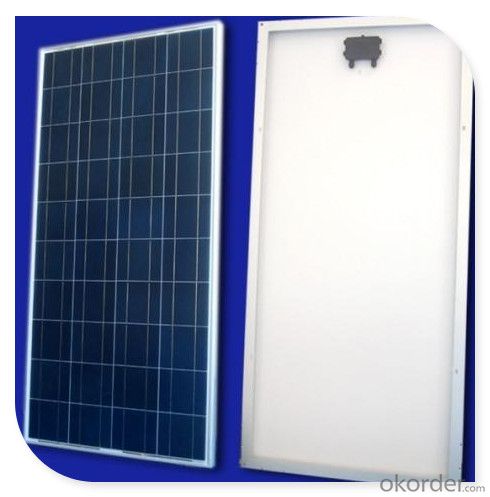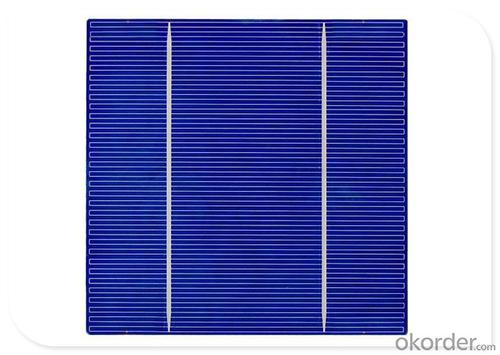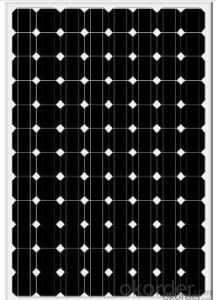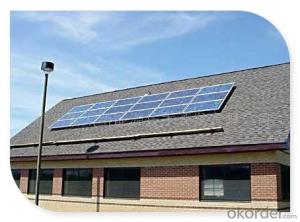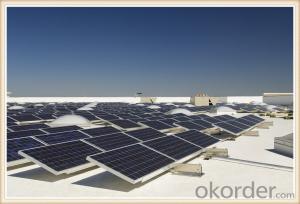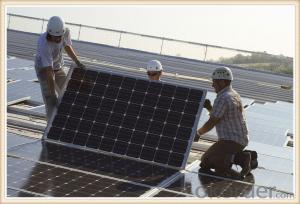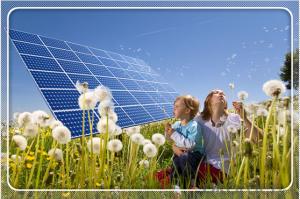Best Folding Solar Panels - 10W Efficiency Chinese Solar Panels for Sale 5-200W
- Loading Port:
- China main port
- Payment Terms:
- TT OR LC
- Min Order Qty:
- 10000 watt
- Supply Capability:
- 100000 watt/month
OKorder Service Pledge
OKorder Financial Service
You Might Also Like
Specification
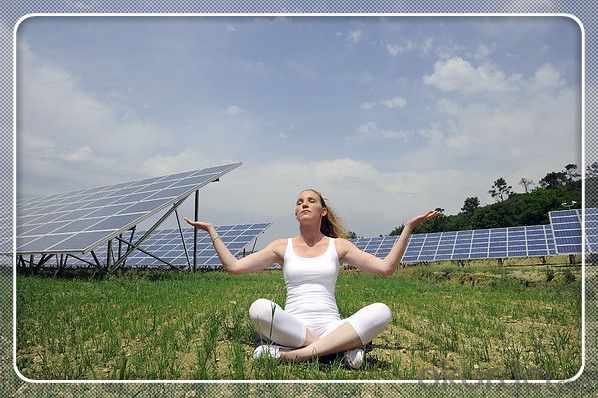
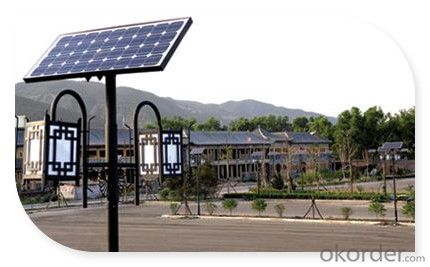
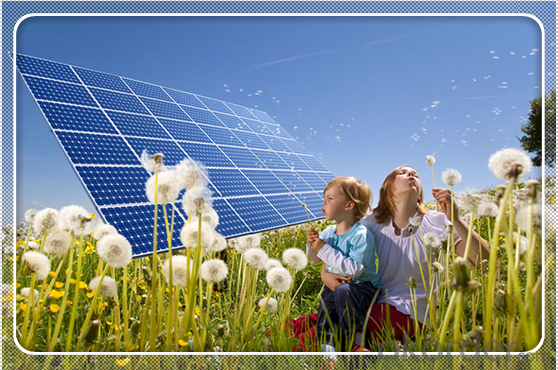
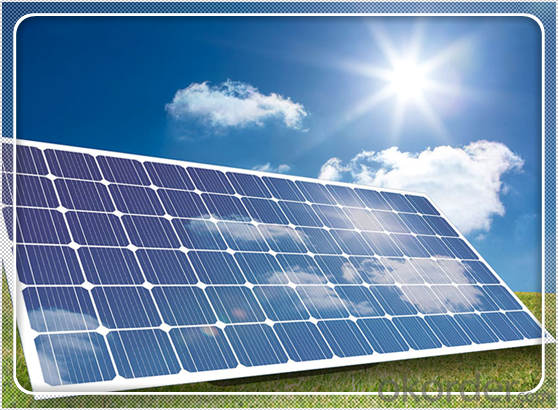
Solar Module Introduction
Solar Module is the core part of solar PV power systems, also is the highest value part of it. The function of Solar Module is to convert the sun's radiation to electrical energy, or transfer it to battery and store in it, or to drive the load running.
The Product has been widely used in space and ground, it mainly used for power generation systems, charging systems, road lighting and traffic signs areas. It could offer a wide range of power and voltage, and with high conversion efficiency, and long service life.
Solar modules use light energy (photons) from the sun to generate electricity through the photovoltaic effect. The majority of modules use wafer-based crystalline silicon cells or thin-film cells based on cadmium telluride or silicon. The structural (load carrying) member of a module can either be the top layer or the back layer. Cells must also be protected from mechanical damage and moisture. Most solar modules are rigid, but semi-flexible ones are available, based on thin-film cells. These early solar modules were first used in space in 1958.
Electrical connections are made in series to achieve a desired output voltage and/or in parallel to provide a desired current capability. The conducting wires that take the current off the modules may contain silver, copper or other non-magnetic conductive transition metals. The cells must be connected electrically to one another and to the rest of the system. Externally, popular terrestrial usage photovoltaic modules use MC3 (older) or MC4 connectors to facilitate easy weatherproof connections to the rest of the system.
Secification
Model Type | |
Peak Power-Pmax(W) | 5-200W |
Open Circuit Voltage-Voc(V) | 44.2 |
Maximum Power Voltage-Vmp(V) | 36 |
Short Circuit Current-Isc(A) | 5.4 |
Maximum Power Current-Imp(A) | 5 |
Maximum System Voltage | 1000V DC |
Maximum Series Fuse Rating | 10A |
Power Tolerance | -1~+3% |
Temperature Coefficients of Pmax | -0.45%/℃ |
Temperature Coefficients of Voc | -0.348%/℃ |
Temperature Coefficients of Isc | 0.031%/℃ |
Nominal Operating Cell Temperature | 44.5±2℃ |
Standard Testing Condition(STC) | Irradiance:1000W/m²;Temperature:25℃;AM=1.5 |
Qualification Test Parameters | |
Operating Temperature | -40℃~+85℃ |
Storage Temperature | -40℃~+85℃ |
Pressure Bearing | ≥5400Pascal/m² |
Wind Bearing | ≥5400Pascal/m² |
Mechanical Characteristics | |
Cell Size | Mono 125*125mm±0.5 |
No.of Cells | 72pcs(6*12) |
Dimension | 1580*808*40mm |
Weight | 15.5Kg |
Glass | 3.2mm High Transmission,Low Iron |
Frame | Anodized Aluminum Alloy |
Junction Box | IP65Rated |
Internal Diodes | 3 Bypass Diodes |
Cable | 1*4.0mm² Length 900mm |
Images
Packing & Shipping:
We have rich experience on how to pack the panels to make sure the safety on shipment when it arrives at the destination.
The normal size is packed by 25pcs/ carton / pallet. Paper carton for FCL shipping and wood carton for LCL shipping.
Warranty:
For c-Si panel: 25years output warranty for no less than 80% of performance, 10 years output warranty for no less than 90% of performance. Free from material and workmanship defects within 5 years.
For a-Si panel: 20 years output warranty for no less than 80% of performance, 10 years output warranty for no less than 90% of performance. Free from material and workmanship defects within 2 years.
FAQ:
(1)What price for each watt?
It depends on the quantity, delivery date and payment terms.
(2)What is your size for each module? Can you tell me the Parameter of your module?
We have different series of panels in different output, both c-Si and a-Si. Please take the specification sheet for your reference.
(3)Can you provide the peripheral products of the solar panels, such as the battery, controller, and inverter? If so, can you tell me how do they match each other?
Actually we are only manufacturer of solar panels, but we could try to source them for you in China if you need. We could provide you an optimal system design to instruct you how to install.
(4)Do you have the CE, TUV, UL Certification?
We’ve already passed all the tests, and any certificate is available.
(5)Have you ever sold your products to companies in my country?
Of course, we have customers in all general PV markets, but I think we should expand our market share along with the market growth.
(6)When did your company set up? You are a new company, how can I believe your quality?
We entered into Solar PV industry in 2005, now we have several plants in manufacturing of a-Si and c-Si panels, and our capacity is 220MW per year. Till now we have already passed all the tests by authorized laboratories, e.g. TUV, VDE, UL.
(7)Can you help us install the module if we cooperate with you?
We haven’t entered into installation sector, but we have the plan in near future.
(8) How do you pack your products?
We have rich experience on how to pack the panels to make sure the safety on shipment when it arrives at the destination.
(9) Can you do OEM for us?
Yes, we can.
(10)Can we visit your factory?
Surely, I will arrange the trip basing on your business schedule.
- Q: Can solar panels be installed on sloped roofs?
- Yes, solar panels can be installed on sloped roofs. In fact, sloped roofs are one of the most common locations for solar panel installation. The angle and direction of the roof can affect the efficiency of the panels, but with proper installation techniques, it is possible to maximize their energy generation potential on sloped roofs.
- Q: What are solar panels?
- Solar panel is a generic term used to describe a device that collects and converts solar energy into electricity or heat. Photovoltaic module, used to generate electricity Solar thermal collector, used to generate heat Solar hot water panel, used to heat water, often in homes but i guess u mean the ones which generete electricity a photovoltaic module is a packaged interconnected assembly of photovoltaic cells, also known as solar cells. An installation of photovoltaic modules or panels is known as a photovoltaic array. Photovoltaic cells typically require protection from the environment. For cost and practicality reasons a number of cells are connected electrically and packaged in a photovoltaic module, while a collection of these modules that are mechanically fastened together, wired, and designed to be a field-installable unit are known as a photovoltaic panel or simply solar panel. A photovoltaic installation typically includes an array of photovoltaic modules or panels, an inverter, batteries (for off grid) and interconnected wiring.
- Q: Can solar panels be used on boats or marine applications?
- Yes, solar panels can be used on boats or marine applications. They are a popular and effective source of renewable energy for powering various systems on boats, such as lights, navigation equipment, and even charging batteries. Solar panels are lightweight, durable, and designed to withstand harsh marine environments, making them suitable for use on boats and other marine applications.
- Q: Can solar panels power an electric car?
- Yes, solar panels can indeed power an electric car. By converting sunlight into electricity, solar panels can charge the car's battery, allowing it to run solely on solar energy. This combination of solar power and electric vehicles promotes sustainable transportation and reduces reliance on fossil fuels.
- Q: Can solar panels be used in areas with high levels of snow or ice?
- Yes, solar panels can be used in areas with high levels of snow or ice. However, the efficiency of solar panels may be reduced during these conditions. Regular maintenance and snow removal are necessary to ensure optimal performance. Additionally, tilted solar panel installation and using anti-reflective coatings can help minimize snow accumulation.
- Q: Can solar panels be installed on a convention center or event venue?
- Yes, solar panels can be installed on a convention center or event venue. In fact, many convention centers and event venues are embracing renewable energy solutions, including solar power, to reduce their carbon footprint and lower electricity costs. Installing solar panels can provide a reliable and sustainable source of energy, making it an ideal choice for these large-scale facilities.
- Q: I am starting to think about solar panels as an option for my home. I have done some research on panels, to be honest its all very confusing. There are many different panels some with 60 watts some all the way up to 20 watts. My household currently uses about 2700 to 3400 kWh every two months. So based off of my power usage maybe you can answer some of the following questions:What kind of panels should I be looking at?Which panel manufacturers give the best bang for the buck (reliable/affordable)?Anything else I should be concerned about?I am just starting out in educating myself on solar power so please excuse me if I sound very naive. Any information that you may have will be helpful. Thanks in advance.
- I'm not an expert, but I recently went through the process and now have a system on my home. I got 3 quotes from 3 licensed contractors and they all seemed to be about the same, the prices seemed to be based on the amount of energy they produced. In CA and I'm sure everywhere else they are tested by an independent agency which rates the output of the panels. You seem to have similar usage as my house, I got a 3.75kwhdc unit, it isn't expected to eliminate my bill, but it should reduce it by quite a bit. I've only had it for a few months and it took me from about 45 kwh per day to around 0. I know I'll have lower output in the winter, but my usage is lower in the winter as well. I decided on this size unit to maximize my rebates and I can take advantage of my utilities rebates when I add to the system in a few years. The difference between panels seemed to be how big they were. Some systems can be twice the size and produce the same amount of energy. I put a couple links below that I found helpful. The roseville pv buy down program has some great links that give information about specific systems.
- Q: Can solar panels be installed on boats or RVs?
- Yes, solar panels can be installed on boats or RVs. In fact, they are increasingly popular as a renewable energy solution for these mobile vehicles. Solar panels on boats and RVs can help generate electricity for various applications, such as powering appliances, lighting, or charging batteries. They provide a sustainable and cost-effective way to harness solar energy while on the move.
- Q: How much would it cost to make an average size house be able to depend on solar panels for all of its power?How many solar panels would you need and wear would you put them? Would the roof be large enough to support the panels needed?Do solar panels work well in higher latitudes like northern USA or southern Canada? Can you power your house for the whole year if you live in these environments? What kind of maintenance do solar panels require?
- In the US, the average electricity consumption for a house is 958 kwh per month which is 32 kwh per day for a 30 day month. Once you get to New York City, the number of hours of usable sunlight drops to four hours per day so using six hours a day as a guideline and the fact that inverters tend to be 65% efficient, you wind up requiring 8.205 kw of solar panels which at $5 a watt amounts to $4,205 not including the inverter. Your first task would be to reduce your energy use. Keep in mind that the effective cost of solar power in 2007 was 38 cents per kwh. Without government incentives, you wind up paying more for your electricity than had you just bought it from the grid.
- Q: How do solar panels affect the local economy?
- Solar panels can have a positive impact on the local economy in several ways. Firstly, the installation and maintenance of solar panels create job opportunities, boosting employment rates in the area. Additionally, the production and sale of solar panels contribute to the growth of local businesses, stimulating economic activity. Moreover, solar energy reduces reliance on traditional energy sources, leading to lower energy costs for businesses and households, resulting in increased disposable income for residents. This, in turn, can spur consumer spending and support local businesses. Overall, solar panels can drive economic growth, job creation, and cost savings within the local economy.
Send your message to us
Best Folding Solar Panels - 10W Efficiency Chinese Solar Panels for Sale 5-200W
- Loading Port:
- China main port
- Payment Terms:
- TT OR LC
- Min Order Qty:
- 10000 watt
- Supply Capability:
- 100000 watt/month
OKorder Service Pledge
OKorder Financial Service
Similar products
Hot products
Hot Searches
Related keywords
